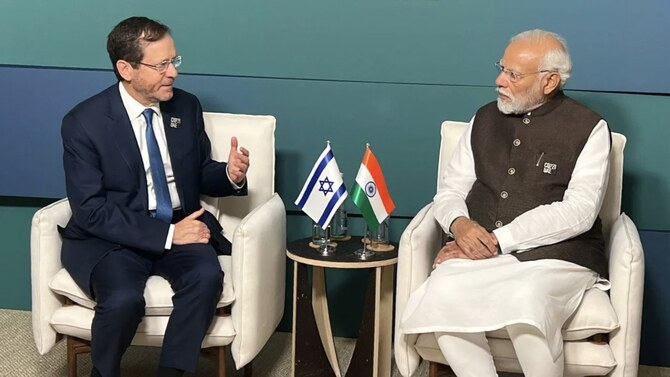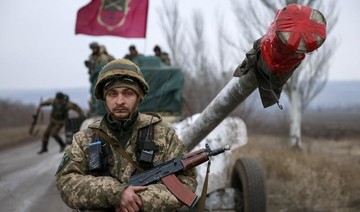NEW DELHI: Top lawyers are sounding the alarm over the consequences of Indian arms exports to Israel, which they say violate international conventions and the country’s own domestic law in the wake of the war on Gaza.
Indian arms sales to Israel came into the spotlight in May, when two cargo ships were prevented from docking in the Spanish port of Cartagena after reports that they were loaded with weapons.
The first vessel was en route from Chennai in southeast India to the Israeli port of Ashdod — some 30 km from Gaza — and was blocked by Spanish activists. The second was on the way from Chennai to Haifa, and was officially denied entry, with Spanish Foreign Minister Jose Manuel Albares confirming to the media that the vessel was carrying a shipment of arms to Israel.
In June, after Israel’s deadly bombing of a UN-run school sheltering thousands of displaced people in central Gaza, Palestinian reporters released a video showing the remains of a missile found in the rubble after the attack. A label on it read: “Made in India.”
The reports have triggered an uproar among Indian civil society and opposition politicians, who have requested clarification from the Ministry of Defense and the Ministry of External Affairs over the military cooperation in the wake of Israel’s deadly onslaught on Gaza and a genocide case against the country in the International Court of Justice.
A recent petition signed by Supreme Court lawyers, judges and retired foreign service officials called on Defense Minister Rajnath Singh to halt the issuance of licenses to companies supplying military equipment to Israel and cancel the existing ones, as the exports are not only “morally objectionable” and “abominable,” but also constitute a “serious violation” of law.
“It’s very clear that genocide is being committed in Palestine by Israel; the International Court of Justice has virtually said so,” Prashant Bhushan, a public interest lawyer in the Supreme Court of India, told Arab News.
“India is clearly aiding that genocide.”
A Ministry of Defense spokesperson told Arab News on Saturday that “it is the Indian government’s policy not to sell weapons to countries in conflict” and that the government “has not authorized the supply of any weapons to Israel during the last several months.”
The spokesperson did not comment on canceling existing licenses.
At least 40,334 people — most of them children and women — have been killed and more than 93,300 wounded in Israeli military attacks on Gaza since Oct. 7, according to the Palestinian enclave’s Health Ministry estimates.
The real toll, however, is believed to be much higher as the ministry’s data does not include people buried under rubble, those who died of their injuries or who starved to death, as Israeli forces have been blocking international aid. One of the world’s leading medical journals, the Lancet, estimated last month that the actual death toll of Palestinians killed in Gaza could exceed 186,000 — or almost 10 percent of the territory’s population.
The substantial evidence of Israel breaking international humanitarian law, the genocide and war crime proceedings against its leadership in the ICJ and International Criminal Court, as well as a new case brought by Nicaragua against Germany over its support for Tel Aviv, create legal circumstances in which India can be charged with violating its own constitution and international law.
Dr. Anwar Sadat of the Indian Society of International Law said that the violations are on “several” levels, starting with international humanitarian law.
“Israel is targeting civilian population consistently. Israel is targeting hospitals, Israel is targeting supply lines, Israel is targeting the supply of humanitarian assistance to Palestinian people,” he told Arab News. “Israel is in serious violation of international humanitarian law, so you cannot support and supply, or in any way assist it.”
Sadat said that by providing military assistance to Israel, India also risks being charged with breaching the Genocide Convention and may face a similar case to the one recently initiated against Germany. Genocide and ancillary crimes of genocide, such as complicity, are subject to universal jurisdiction.
In late March, Nicaragua instituted proceedings against Germany at the ICJ under, inter alia, the Genocide Convention, concerning “alleged breaches of certain international obligations in respect of the Occupied Palestinian Territory” arising from Germany’s support and military supplies for Israel.
“If you are a party to this convention, and India is a party to the Genocide Convention, you have international legal responsibility to prevent the commission of genocide,” Sadat said.
“Any breach of international legal obligations requires reparations, compensation.”
India would not be able to absolve itself, as it is not safeguarding any essential interests by breaching the law.
“There is no such situation before India,” Sadat said. “Not providing the arms to Israel does not make India unsafe in any way, so it has no plea of necessity.”
Advocate Chander Uday Singh, a Supreme Court lawyer who was also among the petitioners demanding that India immediately stop all exports of military material to Israel, warned that India is also acting against its own domestic law.
Article 51C of the Indian Constitution says that is the state’s duty to “foster respect for international law and treaty obligations.” This includes the Genocide Convention, of which provisions are directly binding for India also on the domestic level, as it has not framed its own.
“India was the signatory to the Genocide Convention in 1949 and then thereafter it has ratified the convention in 1959, so under international law we are completely bound by the Genocide Convention, meaning we are contracting party to it,” Singh said.
“The Genocide Convention also requires contracting parties to frame national laws and give effect to the convention within the country ... the fact that we have not framed the domestic law means that that the convention itself can be looked at, and the principles of the convention can be applied by Indian courts.”



























